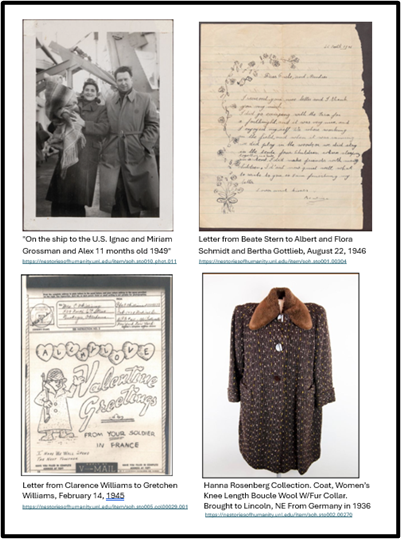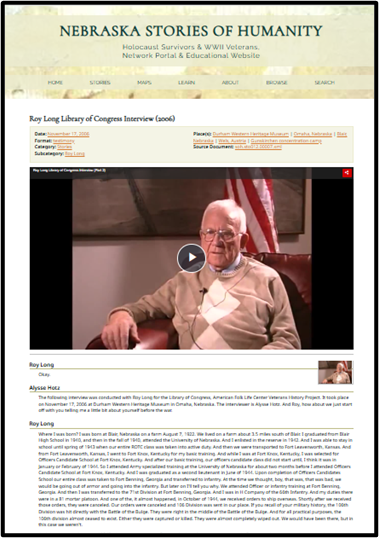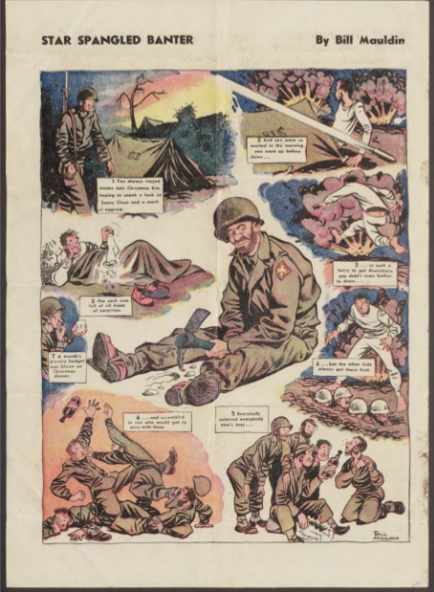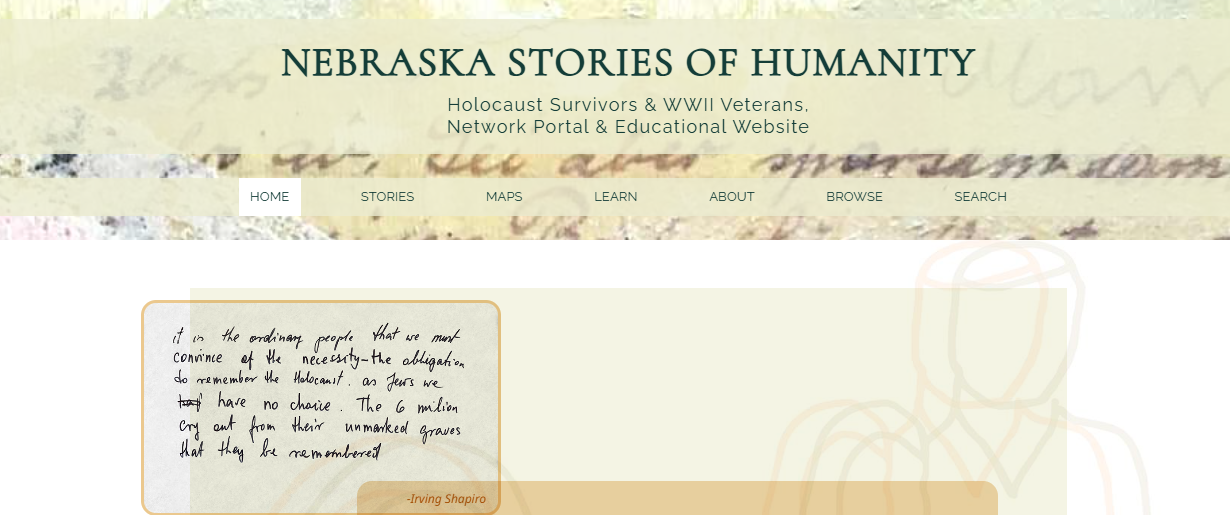This article was written by Beth Dotan, a TPS Midwest Region Grantee
More than 25 years ago, the Library of Congress established the Veterans History Project (VHP) through Congressional legislation that became Public Law 106-380. This program, which sprouted from a grassroots effort to capture personal stories of former servicemen and women, blossomed into a much more significant endeavor. The project is embedded within the Library of Congress's American Folklife Center, and over the years, it has provided opportunities to engage with veteran history in various ways. I could not have imagined, after being inspired by the printed VHP Field Kit booklets over 20 years ago, that our modest community effort to gather video of Nebraska Jewish War Veteran Stories would lead to significant digital integration within my own scholarship today.
The Nebraska Stories of Humanity: Holocaust Survivors and World War II Veterans, Network Portal and Educational Website features narratives from Nebraska individuals who survived the Holocaust and World War II, as well as liberators of Nazi camps, by connecting web visitors to the local community through the broad, transnational nature of the site’s components. The digital resource aggregates artifacts, primary documentation, testimony, and collections from personal and international open-access resources, including the Library of Congress Veterans History Project (Figures 1 and 2). For research and educational purposes, all materials are fully transcribed, enabling full-text search accessibility.

Figure 1

Figure 2
The unique and dynamic micro-collection is enhanced with digital tools, such as interactive maps and curricular Holocaust pedagogy, with the intention of maximizing statewide educational benefits and peaking international interest. Following a workshop with the TPS Midwest Regional directors last Fall, one teacher noted, “The primary source tells the person's story in their own words, which my students find powerful.” The site, launched in the spring of 2022, has experienced significant growth over the past three years, partly due to the insight of Nebraska educators and their interest in teaching the topic through primary sources.
Transcriptions
Students from our undergraduate intern program at the University of Nebraska, Lincoln, have transcribed and coded testimonies, including interviews collected in Nebraska from 2006 to 2009, as part of the Veterans History Project effort. This invaluable work provides searchable texts, as mentioned, yielding insights into historical events or groups, such as the “Free France” resistance against the Axis powers, or details described by servicemen as they entered Hitler’s “Eagle’s Nest” at Berchtesgaden in Germany. What impact does it have on our project? Testimony transcriptions have led to new contacts with local families and a broader investigation into the participation of Nebraska veterans in World War II. Normalizing names and places online through the narratives resulted in researchers seeking networks for their own projects.
The ongoing development of the Nebraska Stories of Humanity web project reveals unexpected discoveries as we acquire new content for individual stories. When transcribing the testimonies of Nebraska servicemen from the Library of Congress Veterans History Project through Teaching Primary Source grants, we became aware of other primary source materials within the Library’s collections that could further enhance the appreciation of these individual histories. The corresponding findings have ignited momentum to integrate digital access to more holdings where applicable, as we expand the depth of the Liberator narratives with learning opportunities. New supplementary content from both the Library of Congress and our collection, including World War II military history, materials about resistance, and even teaching strategies through military comics, will bolster teaching strategies using TPS methodologies.

From the collection of Melvin Thielbar, Nebraska Stories of Humanity
Educational Implications
As the Nebraska Stories of Humanity: Holocaust Survivors and WWII Veterans, Network Portal and Educational Website was developed, we understood that streamlining alliances with educational and community organizations would enhance our content and exposure. Since the nature of our collection involves gathering materials from archival sources already preserved in numerous places, there is an incentive and a need to collaborate wherever possible. Community historical societies, humanities groups, and Holocaust-related stakeholder members have provided valuable critiques and recommendations in the development of the resource and in promoting the site to their extensive memberships.
In response to the 2022 Nebraska Revised Statute 79-760.01 mandating Holocaust and genocide education in secondary schools, our website serves as an effective instrument to comply with Nebraska state English Language Arts and Social Studies standards in teaching about the Holocaust. The Nebraska Stories of Humanity website and supporting materials from the Library of Congress are incorporated into the site’s educational segments through educator-developed College, Career, and Civic Life (C3) Inquiry-Based Lesson plans. Each lesson encourages students to observe, select, investigate, and inquire about how artifacts and primary sources support them in historical study, setting the path for a grounded classroom lesson.
After piloting one of the lessons in his classroom, a cohort educator from the project commented that
“…the students said that engaging with material about people who lived where they live now or in their home state was very meaningful to them. They were very interested to know that these people had worked and lived and owned businesses in Omaha, Nebraska, or in Nebraska, in general. I thought that resonated really well. The artifacts made it a story - made it more alive for them. It made it more real to see pictures of actual people…individuals we could follow through the path a little bit.”
Nebraska educators have further expressed that as we are distanced further from World War II and the Holocaust, making the events real and relevant becomes increasingly more difficult. They have appreciated having local content easily accessible in one online space, particularly in the present environment where comparisons to this complex history can be oversimplified and taken out of context, leading to misinformation. They stressed that having primary source materials that are both “local” and “historical” provides a human aspect to real events and situations. The varied contents provide an understanding of the environment in which they were created – hand-written cursive letters written on thin onion-paper, military meal vouchers distributed on European trains, personal testimony in numerous forms, and even illustrated army catalogues or maps that provide a more personal history as opposed to simply learning dates or the order of battles.
Our newest Teaching Primary Sources grant enables the project to expand its focus on Nebraska servicemen's involvement in World War II. Following discoveries of illustrations and cartoons within the Nebraska Nazi camp liberators’ collections, we forged new partnerships with faculty at the University of Nebraska-Lincoln who have expertise in teaching through military comics. As such, a spring educator workshop will include using TPS analysis tools through a comic search in the NE Stories collections, while also utilizing complementary LoC primary sources. We hope to provide an exciting workshop model for the TPS Network!
The NE Stories of Humanity web resource embraces inspiration from projects such as the Library of Congress Veterans History Project, as well as new opportunities to introduce archived materials in new formats. Our partners at the Nebraska Department of Education have expressed how this growing teaching tool has shown teachers how to “educate empathy.” Our engagement with the broader teaching community to encourage the use of credible evidence from a variety of authoritative sources expands a more profound understanding for Nebraska’s educators, students, families, and other stakeholders.
